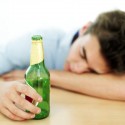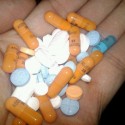Marijuana proponents urge colleges to mellow out
INDIANAPOLIS — Hey dude, can we talk?
Marijuana advocates who say pot is safer than alcohol want colleges to wade into a hazy debate over whether schools’ tough pot penalties are actually worsening their drinking woes.
They argue that stiff punishments for being caught in a campus dorm with pot steer students to booze and add to binge drinking, drunken brawls and other booze-soaked troubles.
“You know, when you get high on marijuana you don’t act violent _ you just kind of sit there,” said Mason Tvert, leader of a Denver-based group stoking the pot-vs.-booze debate.
His group, Safer Alternative For Enjoyable Recreation, has helped students at 13 colleges pass measures calling on their schools to set pot penalties no worse than those faced by underage students caught drinking or other alcohol violations. So far, no schools have changed their pot penalties, he said.
SAFER calls its nonbinding referendum push the “Emerald Initiative,” a play on the Amethyst Initiative more than 130 college presidents signed last year. The presidents want lawmakers to rethink the national drinking age of 21, arguing that current laws drive college drinking into the shadows and encourage binges.
The leader of the Amethyst Initiative, John McCardell Jr., president emeritus of Vermont’s Middlebury College, says there’s a big difference between the two debates.
“The fact is marijuana is prohibited across the board. It’s not a matter of age discrimination, as where alcohol is concerned,” he said.
Tvert argues the pot-vs.-booze question is still a valid debate.
“If they’re willing to talk about letting 18-year-olds use a seriously harmful drug, why shouldn’t we talk about whether they should be allowed to use a drug that’s far less harmful?” he asked.
Federal statistics show that college students who drink are prone to binge drinking, drunken brawls, accidents, sexual assaults and alcohol poisoning.
Marijuana’s full effect on college students isn’t as clear.
According to the National Institute on Alcohol Abuse and Alcoholism, about 1,700 college students ages 18 to 24 die each year from alcohol-related injuries, and 599,000 more are injured. The institute also estimates there are more than 696,000 alcohol-related assaults each year _ two-thirds of them by students under 21.
On marijuana, the White House’s Office of National Drug Control Policy says in its “Myths & Facts” report that even a moderate dose can impair driving performance, and that 15 percent of trauma patients injured while driving a car or motorcycle had been smoking pot.
Few schools suspend students caught on campus with pot, said ThomasWorkman, chair-elect of a group sponsored by the National Association of Student Personnel Administrators that tracks campuses’ drug and alcohol policies and trends. He’s also an assistant professor of communication studies at the University of Houston-Downtown.
More common are policies that remove pot-smoking students from residence halls and allow them to continue their classes, often with some form of counseling to address their drug use.
“We just don’t have a lot of highly successful students who are potheads,” Workman said.
Tvert said his group’s marijuana-penalty measure has passed at every college where the question has come to a vote. They are Colorado State University, University of Colorado at Boulder, Florida State University, University of Maryland, University of Texas at Austin, George Washington University (Washington, D.C.), College of William & Mary (Virginia), University of Washington, University of Central Florida, College of DuPage (Illinois), Ohio State University, Purdue University (Indiana) and University of Arkansas at Fayetteville.
Purdue has a zero-tolerance policy for students caught in their campus rooms with marijuana or other illegal drugs. But Sara Wislocki, a junior majoring in interior design, said the rules don’t make sense because students who routinely drink, not their pot-smoking classmates, are the campus’ big problem-causers.
“You hear about it all the time that so-and-so had to go to the drunk tank because he caused a ruckus or whatever. But the students who aren’t causing the problems are being targeted more,” said Wislocki, president of Purdue’s chapter of the National Organization for the Reform of Marijuana Laws.
School records show 691 students were involved in alcohol-related cases in residence halls during the 2007-08 school year, and 18 of those students lost their rooms. The same school year, 51 of 62 students caught in campus housing with marijuana or other illegal drugs were evicted from their units.
Purdue spokeswoman Jeanne Norberg said students are not required to live in campus housing, and those who do agree to abide by residence hall rules and face penalties for breaking them.
Debates aside, studies showing that marijuana affects memory and learning in college-age youth more powerfully than in adults may be one good reason schools are tough on pot users, said Scott Swartzwelder, a professor of psychiatry at the Duke University Medical Center.
“Think about what college students are there to do _ they’re there to learn,” he said
© 2009 The Associated Press

